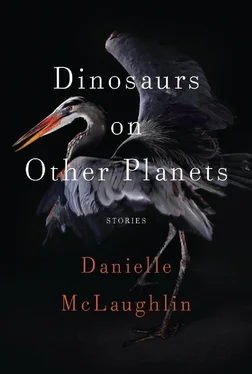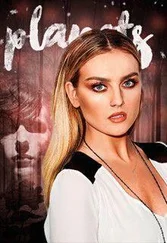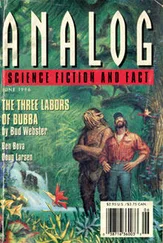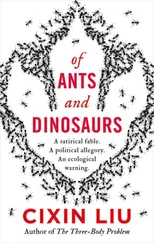“It wouldn’t have happened if my other lodger was here,” Lou Anne said. “He’s very good with her, but he has to go to lectures on Wednesdays.” I wondered why she bothered to lie to the nurse about Marcus, because what difference could it possibly make to the nurse if Marcus was at lectures or not? And then her voice dropped lower, but not low enough, and I heard her say: “She’s been out of sorts lately, since”—and here she paused—“since the change in our living arrangements.”
I spent most of the day in my room, expecting Lou Anne to come looking for me. That was what my mother did when she and I fought, and I knew, without fully understanding how it had come about, that Lou Anne and I were fighting. Midafternoon I went downstairs to make a sandwich. I heard the crackle of Lou Anne’s radio coming from behind the draped fabric that separated her bedroom from the rest of the kitchen. I boiled the kettle and rattled the lid of the bread bin to let her know I was there, but she didn’t come out, and I took my sandwich back upstairs. Sometime after nine P.M. that evening the doorbell rang and there was the usual clamor of bolts. I’d dozed off, and now I sat up and smoothed down my hair, arranged myself into what I imagined to be a more graceful pose. I heard Marcus and Lou Anne talking first in the hall, then their voices fading as they moved to the living room. After a while, I heard footsteps on the stairs, then a knock on my door. “Come in,” I said.
Marcus came in and stood beside my bed. For once, he wasn’t wearing the green jumper, but a red and blue checked shirt that smelled of smoke. He picked up the book I’d been reading, one from my college syllabus, and turned it over to look at the cover. “Ah, yes,” he said. “Rhys. What do you think of her?”
“She’s good,” I said, carefully. There was more I could have said: how all week I couldn’t shift from my head the images of Coulibri gone wild, the smell of dead flowers mingling with living ones; a poisoned horse beneath a tree, its eyes black with flies. But I’d learned to be wary when discussing books with Marcus. When I didn’t say more, he sighed and closed the book, settled himself on the edge of the bed. “Lou Anne told me you hit Cassie today.”
“She was on top of me,” I said, “she was hurting me, and—”
He held up a hand. “You must never do that again,” he said. “Never under any circumstances. Do you hear?”
“She could have killed me.”
“It makes no difference what she does. You must never hit her.”
All day I’d imagined the ways in which he might comfort me. Aggrieved by the unfairness of it all, I swung my legs over the other side of the bed and faced away from him. He reached across and rested a hand on my shoulder. “Listen,” he said. “This is important. It mustn’t happen again. Do you understand?”
I nodded without looking at him.
“Could you apologize, do you think?”
The idea didn’t appeal to me. “She’s asleep,” I said.
“I meant would you apologize to Lou Anne.”
“No,” I said.
He sighed and got up, ran a hand through his hair. “All right,” he said. “But can I at least tell her it won’t happen again?”
“Tell her this,” I said. I lifted my blouse and pointed to a circle of bruised skin just below my ribs which, to my satisfaction, was already darkening to purple. He came round to my side of the bed and, swearing under his breath, stooped to inspect it. I saw that his hair and the collar of his shirt were damp, and thought that he must have walked from the city center and that was why he was late. He went as if to touch the bruise, but pulled back. “I’m damned if I need any of this,” he said, straightening up, and, without saying anything more, he walked out of the bedroom. After he’d gone, I tried to read a little more of my book, but couldn’t. I switched off the light and climbed fully clothed into bed. I pulled the sheets over my face, frightened for the first time of the moths that at night crashed headlong into the hot bulb of my bedroom lamp, their blackened stumps scattered across the floor in the mornings.
—
THE NEXT EVENING I ate in the college canteen and came home as late as I dared. Even though I was being perfectly quiet, Lou Anne put a finger to her lips as she let me in and said, “Shh, she’s asleep,” as she secured the door. The bolts, Marcus had explained, were on account of Cassie, who sometimes wandered downstairs at night and had once made her way onto the street. I presumed Lou Anne and I were still fighting, but once she’d finished with the door she said, “I’ll make some tea,” and disappeared into the kitchen. I went into the living room and sat at the table. “Goodness,” Lou Anne said, arriving back with a tray. “It’s almost dark.” She put down the tray and moved about the room, switching on lamps. Her cheeks were flushed and I noticed that as well as the tea things, the tray held a small bottle of whiskey. She sat across from me at the table and poured tea into two mugs — the delicate china of that first evening had never again materialized. “Where’s Marcus?” I said.
Lou Anne frowned. “How should I know?” she said. “He’s a young man. I expect he’s off doing whatever it is that young men do. Why should you or I worry our heads about him?” She leaned closer. “That’s what women do,” she said. “They do it all the time; they worry about men. We did it, your mother and I, we were fools for men.” She splashed some whiskey into her tea, seemed to consider for a moment before offering me the bottle. When I shook my head, she dribbled a little more into her own cup. “You know what you need to do?” she said. “You need to make some friends instead of hanging out here every evening. You’re young. This is your chance to have fun. If your mother was here, that’s what she’d tell you.”
I doubted this very much, but before I could say anything, Lou Anne got up and rummaged in a chest of drawers, tut-tutting in exasperation as she pushed aside old catalogs and oddments of fabric. She brought out a photo album. “I want to show you something,” she said. Thumbing through the pages, she stopped at a photo. It took me a moment to realize it was of herself and my mother. It must have been taken in the years before my parents were married, because my mother was in a short skirt and was smoking a cigarette. “You’re the image of her,” Lou Anne said, and, putting a finger to my chin, she tilted my face first one way then the other. “That day you arrived on my doorstep, it was like an apparition.” She sighed and turned the page to another photo. This one was of Cassie when she was younger, standing with her hand outstretched. Spread across her palm, covering it almost entirely, was a red-and-blue butterfly, an enormous jewel of a thing, circles of silver dotted along the perimeter of its wings, a golden fuzz on its belly.
“Daddy ordered it through a catalog,” Lou Anne said. “It came all the way from the Philippines. The stamps were almost as beautiful as the butterfly. I have them still.”
I stared at the butterfly, imagined it plucked from the teeming colors of a rain forest, killed, boxed, and transported to a damp, muted house in Drumcondra.
“Cassie was very fond of Daddy,” Lou Anne said. “He was always helping her with the butterflies. She misses him terribly.”
Marcus arrived home just then. Lou Anne undid the bolts and let him in, and as soon as he entered the room I could tell that he’d been drinking. Lou Anne must have noticed, too, but she just poured some whiskey into a glass she took from the top of the dresser, a little gold-rimmed sherry glass, and handed it to him. He drank it back in one go, then, taking the bottle, poured himself another. He switched on the television and threw himself into an armchair. It was a motor-sports program, and the room filled with the waspish drone of racing cars. Lou Anne walked over to the TV and switched it off. “Give me a hand with this,” she said, gesturing to the piano. I didn’t know if she meant me or Marcus, but Marcus didn’t stir, so I got up and began to help her move things. A jug I’d presumed empty turned out to contain stagnant water and the mulchy remnants of petals that sloshed over the sides when I lifted it. “Careful,” Lou Anne said. “That piano’s worth twenty grand.” I froze, the jug in my hand, brown slime dripping onto the dark wood of the lid. From his armchair, Marcus began to laugh. I saw Lou Anne struggling to keep a straight face, then she laughed, too. “Don’t you think I’d sell it if it was worth that?” she said, seating herself at the piano stool. “Look around you. Do you think there’s anything here that I wouldn’t sell if I could?”
Читать дальше












